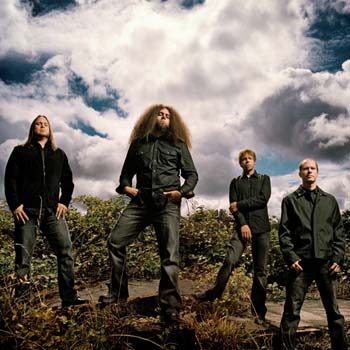Coheed And Cambria interview
Coheed & Cambria
Alertante Ending
For Coheed And Cambria, it was the end of the world. For most bands, such a statement would easily qualify as hyperbole or, at the very least, exaggeration. Yet for emo/prog rock stars Coheed And Cambria — vocalist and guitarist Claudio Sanchez, guitarist Travis Stever, bassist Mic Todd, and new drummer (and former Dillinger Escape Plan member) Chris Pennie — it rings startlingly true, on multiple levels.
Appearing: November 2nd at Riviera Theatre in Chicago.
The band’s new album, the ominously titled No World For Tomorrow (Sony), serves as the final chapter in the tale of Coheed And Cambria, the titular characters whose story Sanchez has been chronicling through the band’s discography. The story tells how two parents — Coheed and Cambria — are forced to sacrifice their children so their universe may live, and it only goes on from there. It’s a world that exists not only in the lyrics of Coheed’s music, but an assortment of comic book tie-ins. It’s an indecipherable world pored over by the group’s rabid fanbase, ever attempting to make sense of Sanchez’s vague lyrics and dense writings. A world that, with the release of this record, no longer exists.

Of course, that’s nothing compared to the strife the real-life Coheed And Cambria endured over the last year to get to Tomorrow. At the center of it was an unstable lineup, with Todd exiting briefly before Coheed entered the studio, as well as the permanent departure of former drummer Joshua Eppard. All of which, Stever recalls, not only took its toll on the band, but seemed an ever-present reminder of the album’s emphasis on things ending.
“Of course [the band’s uncertainty] was present, because the whole thing with this album and what it was, the time period that it was written in, was just all the bullshit going on around us, and all the questions and all the different situations that seemed to have just bitter ends to them.” He expands, looking back on the darker days of Coheed And Cambria. “And, so, therefore, all the songs and everything involved in the songs have like this dramatic, I guess apocalyptic [tone]. All the things going on for us personally, fed into the way that the album — that the lyrics and the story and everything — ended up.
“You have all these things going on in the band, Claudio had some personal things, it’s just all those things ended up making it into more of a demise. It already was for the story . . . it just kind of matched up better, because, all his lyrics have always had a lot of personal influence. A lot of influence from his personal life. So . . . in a way it fit perfectly for the ending to this story.”
Indeed, No World For Tomorrow lives up to its title, with recurring themes of closure, finality, and defeat. And while Coheed And Cambria were never known for particularly optimistic and upbeat fare, Tomorrow is a whole other level of heavy. Songs like the sudden and sweeping “The Road And The Damned,” especially, drive home the gravity of the situation, with Sanchez meekly admitting halfway through the song, “I believed/ in the world once in front of me/well now that’s gone.”
Tomorrow is also the most musically accomplished Coheed work to date. While they have never been afraid to experiment, the record sounds — and feels — like an artifact of a group determined to exist, in spite of overwhelming odds. A result, at least in part, of what was at stake for them, including the fate of the band themselves.
— Jaime de’Medici
To learn more about how Coheed have grown, grab the November issue of Illinois Entertainer, available free throughout Chicagoland.











